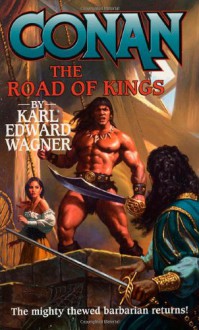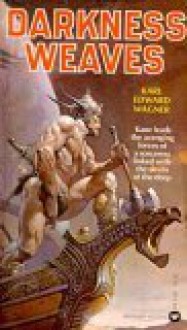
Wagner's pastiches are highly recommended. A groupread from the Sword & Sorcery group in Goodreads led me to this. In short, the milieu was true to Hyborbian Age as discussed above. Also, it followed Conan's development from buccaneer to potential king well; this would serve as a great prequel to REH"s only novel length Conan story The Hour of the Dragon.
Karl Edward Wagner was a dark fantasy hero, taking editing and writing very seriously. His expertise in adventure horror led him to develop the Sword & Sorcery amoral hero Kane (Gods in Darkness: The Complete Novels of Kane), which is legendary stuff. He also paid homage to Robert E. Howard by writing two pastiches: one for REH's hero Bran Mak Morn called Bran Mak Morn: Legion From The Shadows (a sequel to the Worms of the Earth short) and one for Conan called Conan: The Road of Kings. In both cases, Wagner took care to represent REH's Hyborian Age/milieu well while extending the canon slightly.
KEW ensured that Hyborian Age's historic cataclysms affected current life. The same events that sank Atlantis also covered the city of Kordova, the central local of this this book. The still inhabitable, underground city called the Pit and the drowned Kalenius's Tomb are not passive backdrops of history ... but affect the future of the land. The Pit was a great idea, only partially realized. Imagine manor houses and streets at the base of a grand canyon. There were many instances of fiery riots, but the consequences (like excess smoke/oxygen deprivation... and a lack of visibility were not demonstrated). "The Road of Kings" was written in 1979, before the popular Arnold movie that began with the oft quoted below (paraphrased from REH’s opening to Phoenix in the Sword).
“Know, oh prince, that between the years when the oceans drank Atlantis and the gleaming cities, and the years of the rise of the Sons of Aryas, there was an Age undreamed of, when shining kingdoms lay spread across the world like blue mantles beneath the stars—Nemedia, Ophir, Brythunia, Hyperborea, Zamora with its dark-haired women and towers of spider-haunted mystery, Zingara with its chivalry, Koth that bordered on the pastoral lands of Shem, Stygia with its shadow-guarded tombs, Hyrkania whose riders wore steel and silk and gold. But the proudest kingdom of the world was Aquilonia, reigning supreme in the dreaming west. Hither came Conan, the Cimmerian, black-haired, sullen- eyed, sword in hand, a thief, a reaver, a slayer, with gigantic melancholies and gigantic mirth, to tread the jeweled thrones of the Earth under his sandalled feet."—The Nemedian Chronicles -Phoenix in the sword 1932 REH
“Between the time when the oceans drank Atlantis and the rise of the sons of Aryas, there was an age undreamed of. And unto this, Conan, destined to wear the jeweled crown of Aquilonia upon a troubled brow. It is I, his chronicler, who alone can tell thee of his saga. Let me tell you of the days of high adventure! - Wizard from Conan the Barbarian Movie 1982”
Conan: The Road of Kings delivers everything one would want in a pastiche. REH's voice: even though REH wrote in short story form for Conan, this novel still read similarly. It's pace was uber-fast and the fight scene's grim. The milieu was true to Hyborbian Age as discussed above. Also, it followed Conan's development from buccaneer to potential king well; this would serve as a great prequel to REH"s only novel length Conan story The Hour of the Dragon. It was also true to the Sword and Sorcery genre that spawned from REH: Callidos's Stygian Necromancy and controlling of the golem-esque Final Guard worked well for the "sorcery", and plenty of melee satisfied the "sword" aspect.
Illustrations by Tim Kirk start out nicely grim (i.e., execution charms and souvenirs , i.e., hands and heads that amplify the story) but then quickly turn into a sparse picture book glossary for armor and weapons (halberds, swords, etc. that don;t add much to the story). Keeping this from a 5-star is the Climax and Ending. The story arc was well designed but the delivery fell a little flat; the last chapter felt rushed and would have been better served drawn out. That said, Conan: The Road of Kings was a great fast read that will satisfy cravings for more Conan...but will only leave you wanting even another helping!

 Log in with Facebook
Log in with Facebook 









